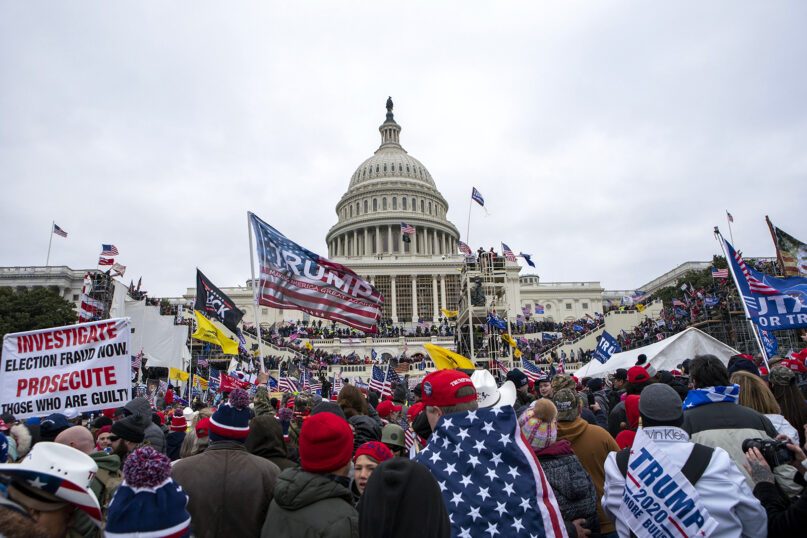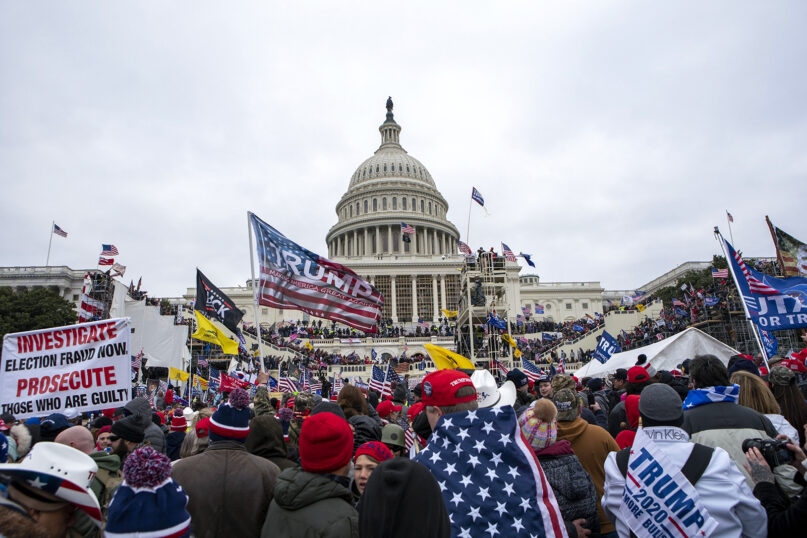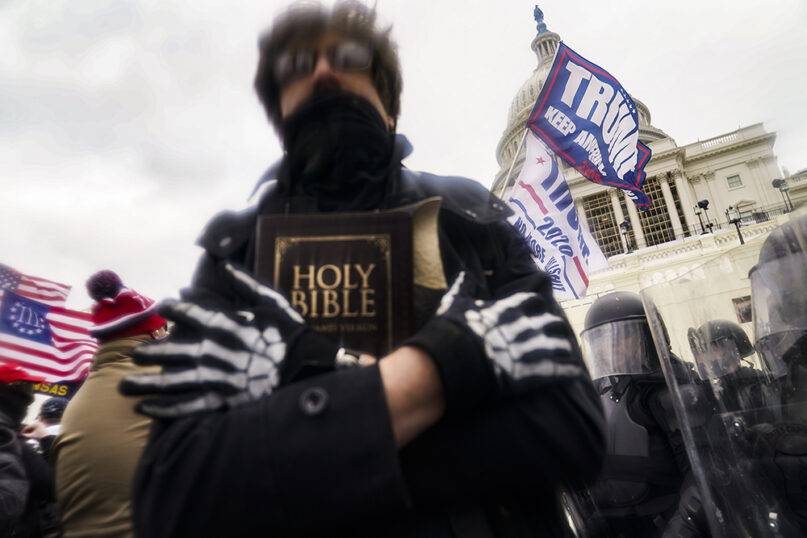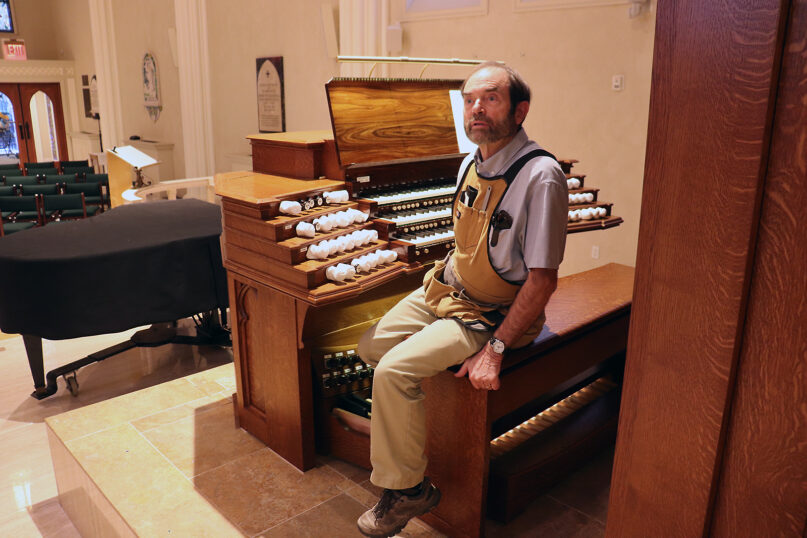Beneath the Surface: Courage, Community, and the Ocean
 […]
[…]
The post Beneath the Surface: Courage, Community, and the Ocean appeared first on Jewish Journal.
 […]
[…]
The post Beneath the Surface: Courage, Community, and the Ocean appeared first on Jewish Journal.

(RNS) — Noelle Cook arrived in Washington, D.C., on Jan. 6, 2021, to photograph the Stop the Steal rally, expecting to gather some images for a graduate thesis project in women’s and gender studies. She ended up chronicling an insurrection — and, more unexpectedly, growing close to some of the women who breached the U.S. Capitol that day.
In her new book, “The Conspiracists: Women, Extremism, and the Lure of Belonging,” Cook, 58, writes about two middle-aged white women from Idaho and Pennsylvania, Yvonne and Tammy, whose lives Cook became intimately familiar with and, eventually, a part of. She traces how they left Christianity for New Age conspiracy theories, believing that shape-shifting reptilians kill children to take their blood and that humans are enslaved within a computer simulation, not unlike in the 1999 film “The Matrix.”
Over more than three years, she came to understand how the trauma and isolation they suffered as a result of abuse, loss and family turmoil made these women susceptible to conspiratorial thinking, and explores the violent implications of these beliefs with curiosity and empathy. Cook spoke to RNS about the radicalization of American women in the five years since the insurrection. This interview has been edited for length and clarity.
In Tammy’s own words, she was always looking to meet people, so she signed up to take a bus to D.C. to the Stop the Steal rally. Yvonne heard Trump say, “Come to DC. Is going to be wild.” In her own words, she told her husband, this is going to be an historic day, I want to be a part of it. And so they packed up their car in Boise and drove to D.C. cross-country. Both of them went with the intention of a rally. They did not know they were going to be directed to the Capitol.
Tammy, in hindsight, knows that with the tear gas and alarms going off, she shouldn’t have been inside the Capitol. She was not remorseful, but she did accept that she would get a consequence. For Yvonne, I don’t think she ever intended to storm the Capitol, but when the call to action was to go to the Capitol, she was there in the front, and she lost her husband somewhere in the crowd. Again, there was no remorse. Yvonne, during her trial, saw the evidence on the police body-worn camera footage and the CCTV footage, and said she understood how the police would interpret it to be so chaotic. But her rationalization was that the crowd wasn’t angry until they made them angry.

Conspirituality was coined in 2011 by two sociologists to explain the convergence of New Age spiritualism and conspiracies. Oftentimes, it starts in the alt-wellness community — a lot of anti-vaxxers. The pandemic created this perfect storm for different identities and belief systems to converge. There were already groups online set up to sell natural remedies. Now they just had to change the signaling to appeal to moms with the Save the Children slogans, and then signal to QAnon adherents. People from different populations ended up swimming in the same pool of spirituality, which now is New Age beliefs coupled with anti-government and anti-science conspiracies, on top of antisemitism and all the other stuff that’s always been there.
It offers a clear cosmology of good and evil, a sense of chosen identity and a redemptive role for the believer. Politics becomes the sacred, and disagreement becomes a heresy. The spiritual language helps the political beliefs to feel divinely sanctioned. Yvonne believes that she was divinely guided to the Capitol that day. She believes that God, or she calls it now spirit, placed her there so that she could be the truth.
In many cases, it works as a coping mechanism. When people are in times of chaos and confusion, they do tend to look for something to put their faith in that is going to make the answers easier or more clear.
Prior to the Capitol, they both dabbled in online spaces that were wellness and anti-vax-related. Yvonne was an evangelical Christian prior to Jan. 6, in a small church in Idaho. It was really during the pandemic, when the church announced they were closing their in-person gatherings, that the light bulb in her head went off. She decided they were a manmade institution designed to control people. She started dabbling in different ideologies. Church used to provide community and support systems for people, and as fewer people go to physical churches, anyone can become a preacher from their living room. The pandemic accelerated that. QAnon and conspiracies became more like a faith-based belief system.
The pandemic touched everything within the sphere of womanhood in the United States. Education, nutrition, health, keeping your family safe. Gen X women, often they spend a lot of time online. It becomes their social life. In Yvonne’s case, the more YouTube videos she watched and crazy documentaries she took in, the more isolated she became. She wanted to share this with people, and they would basically cut her off.

They’ve already been told they’re crazy by everybody else they know, and it’s about feelings, not facts, for conspiracists. For me, there was genuine curiosity. I didn’t start out empathetic. I wanted to demonize them. It evolved because I started seeing them as people and developing relationships with these women.
In August 2022, Tammy’s sentencing was coming up, and she needed 15 character letters. She told me, I don’t have 15 friends. It hit me in that moment — at this age, in this stage, do I have 15 friends? I started having empathy. A few weeks later, I got a call about her child’s suicide. That’s when I had to shelve the academic piece because I needed to help this person. She had literally no one to help her.
Tammy and Yvonne were complicated. They have so much trauma in their lives. They started out as ordinary women with no affiliation to any kind of political movement. I didn’t excuse what they did. I still thought they deserved consequences. But I saw the other pieces of them.
This is also easy for me to say, because I’m privileged in many ways. I’m not a member of one of the marginalized communities that’s so often attacked by conspiracists. But I think there’s some value to talking to people so different than ourselves, if we can.
(RNS) — Imagine an aquarium.
Not the kind you might have in your house, but more like an oceanarium. This aquarium is filled with gigantic, impressive marine life: shivers of sharks, schools of manta rays, ocean sunfish and sturgeon. We have arrived at the aquarium, bought our tickets and stand in awe to watch the show safely from the other side of the glass.
Less noticeable than the great creatures, hardly visible (definitely not worth the price of admission) are oodles of guppies and minnows, darting here and there. These smaller fish may have been added to the tank to serve as food for the larger beasts. Or perhaps they exist simply to add visual interest. Maybe they are essential to the entire artificial ecosystem. Most likely they fulfill all of these functions and more.
Some of the guppies and minnows are flashy and quick, fleeing as soon as a predator comes along. But some are dull and listless. They may be sick, they may be wounded, spat out, perhaps, by a predator in search of more substantial prey. Some school together, swimming quietly in the darker shadows of the tank. Some hover inside the caves of rocks on the aquarium floor, unseen and out of harm’s way.
We observers on the outside pay little attention to the guppies and minnows. We can barely even see these tiny fish — that is, not until now and then, when one singular sliver of a creature glides right in front of one of the monstrous ones, mattering now, for an instance, because the big one, the one we’ve come here to see, reacts. The tiny one is gobbled up in an instant. We might be horrified, amused or nonchalant.
It is a given, after all, that some of these minnows and guppies will be eaten by more important fish. By virtue of simply being in the tank, they are vulnerable. Only the smartest and strongest among them will survive. We looking on can make sport of watching the hunter hunt the prey. We can cheer on the minnows that succeed in hiding themselves away, and jeer at the ones who swim right into the maw of the predators. We can even root for the big fish. The ones who don’t hide from the sharks deserve what they get, after all. Each minnow or guppy for herself.
Never mind that the tank was built for this.
Never mind that the whole system is rigged for the predators.
This is an analogy.
Like all analogies, its parallels are not perfect. Indeed, the picture I have drawn is enlarged, distorted even, to make the point. As the writer Flannery O’Connor once explained,
When you can assume that your audience holds the same beliefs you do, you can relax and use more normal means of talking to it; when you have to assume that it does not, then you have to make your vision apparent by shock — to the hard of hearing you shout, and for the almost-blind you draw large and startling figures.
I am using this analogy to shout.
I am shouting to — and at — those who don’t — or won’t — understand what happens to too many women (and some men) who are enculturated in, subject to and groomed within systems designed by and for predators whose power comes from those very systems that are designed to ignore or even reward predation.
One small fish in the tank may resist the abuses of power she is subject to. She might reside peacefully in the shadows of the rock in the tank for the rest of her life. Another might cleverly glide atop a shark — out of sight, out of reach — and achieve otherwise unknown heights in deep waters. But another might mistake a shark for a friend and float right into his path.
When those inside the tank are taught that authorities are to be feared and obeyed simply because they are authorities, when women in particular are placed in one of two places — on a pedestal or underfoot — when they have places in the system as décor or tokens or food to be devoured, why are we so surprised by the results? You can’t put guppies and minnows in a tank of sharks and then blame the guppies and minnows when they are eaten alive.
Of course, the real world is not a shark tank. People are not guppies or minnows, nor are they sharks or stingrays or sturgeon. People are much more complicated than fish.
Indeed, that’s why human predators work so hard to gain the trust, perhaps even the affection and love, not only of their victims but of their peers and support systems, too. People have will, intention and agency. But like fish, human beings have instinct and a drive to survive, too. To mix the metaphor: Sometimes a fish knows only to fawn in order to survive.
And this is what predators and abusive systems count on. Some people are in survivor mode already. And some are put into survivor mode by slowly being made dependent on the ecosystem in the aquarium.
There may be only one real predator in the tank. But the whole system is set up to keep the predator satisfied.
Minnows and guppies are expendable. But it’s the big fish that bring in the crowds.

NEW YORK (RNS) — The organ arrived from Utah on a warm August morning. Greeted by holy water, incense and slide whistles, it came in a 53-foot-long truck that was double-parked on Manhattan’s Upper East Side.
The Church of the Epiphany’s priests clambered up on the truck’s loading dock, tossed on stoles and blessed the long-awaited instrument. Their prayers were punctuated by the sound of confetti cannons shot off by about 30 parishioners.
Then, for hours, children, adults and elders into their 90s hoisted pipes and boxes up flights of stairs to the church’s second-floor sanctuary. The biggest spectacle was the entrance of the 600-pound organ console, which parishioners and organ builders spent over 30 minutes wrangling up an external staircase.
“What has been the most beautiful part of this organ is the way it has brought our entire community together,” Denise Cruz, a vestry member, speech pathologist and mother of two, told RNS. “It was all hands on deck.”
Even with reports of declining worship attendance in the U.S. — and an overall reduction in the numbers of professional organists — some churches are investing in new versions of the age-old instrument to fill their sanctuaries with music and possibly attract community members to come inside. The new organ on East 74th Street joins others in New York City, where special concert series introduced new instruments at Trinity Church in September and at St. Thomas Church in 2018.
To the Rev. Matthew Dayton-Welch, the new, handcrafted organ at Church of the Epiphany represents more than a commitment to quality music; it’s emblematic of the final phase of a multiyear, $2.5 million effort to relocate and rebuild the Episcopal congregation, an investment in community as much as sound.

“So many churches make difficult decisions because they’re shrinking and they’re consolidating and they’re trying to survive. And that wasn’t the case here,” Dayton-Welch, the church’s rector, told RNS. “This was the church that was healthy, but it was still willing to risk everything it had in order to create an even better platform in a city where churches don’t get up and move.”
In 2018, space constraints led the nearly 200-year-old Episcopal parish to consider moving from its location at the time, on York Avenue. The congregation set its eyes on the former Jan Hus Presbyterian Church, a larger space just one block north that needed a remodel. But, as Dayton-Welch put it, “crossing First Avenue, for us, we might as well have been crossing the Red Sea.”
The church’s then-rector, the Rev. Jennifer Anne Reddall, was elected bishop of Arizona, propelling Church of the Epiphany into an unexpected rector search. Then, a 2020 excavation of the new property revealed that it sat over a natural creek, and the threat of flooding required a redesigned building foundation.
“We had things flood in the basement of the church,” said Christian Vanderbrouk, who has attended Epiphany for about a decade.
Located in the middle of a medical hub, the church’s community was also hit hard by the COVID-19 pandemic. Congregants recall refrigerated morgue trucks circling the neighborhood. And in 2021, hot steel beam rafters didn’t cool as expected, briefly setting the church ablaze.
“You had a flood, a fire and a plague,” said Dayton-Welch, who arrived at the church in 2023, by which time the church had officially moved to its current location on East 74th Street.

Meanwhile, Church of the Epiphany contracted with Bigelow & Co. Organ Builders in American Fork, Utah, in 2020 to design a new organ for the new space. Bigelow founder Michael Bigelow is a member of The Church of Jesus Christ of Latter-day Saints, and his workshop is in an old LDS church building whose tall ceilings allow for organ assembly.
In April, RNS visited Bigelow’s workshop, where builders were completing the trackers, the mechanical linkages that pull open the valves releasing air into the correct pipe. Like most of Bigelow’s organs, the Epiphany organ uses mechanical tracker action in contrast to electric-action pipe organs, where pressing a key sends an electric signal to open the valve under the corresponding pipe.
Initially, the organ’s sound had a German flair, focused on volume and power, but church leaders’ feedback led the builders to swap some of the neo-Baroque style stops in favor of producing a more expressive, versatile sound.
“That decision was made basically to better serve the Anglican style of liturgy,” said Conner Kunz, an experienced woodworker and member of the Bigelow team. He said Bigelow added a Flute Celeste stop, creating an “ethereal, sort of wavy, shimmery effect” that is “less boisterous than our shrieky little harmonic pipes that are sort of traditional in the neo-Baroque style.”

Builders were also completing an initial phase of voicing the pipes, cutting the ends, adjusting the openings and nicking the edges to shape the sound. David Chamberlin, the tonal director and vice president of Bigelow, is also an organist, with a master’s degree in organ performance. He oversaw the voicing, blowing on each pipe to test the sound quality.
“We want to do something that will create, uplift, enrich, spiritually, the lives of our listeners,” he said.
By late summer, the organ had been disassembled and loaded into tractor-trailers. To prepare for its arrival, the church building underwent a litany of preparations. A team of engineers and HVAC workers reset electrical lines, adjusted the temperature and humidity, and excavated holes in the 140-year-old brick wall to create pathways for the air system “so the organ’s lungs can breathe,” Dayton-Welch explained.
He said that, typically, you build an instrument after a room, but the construction of the new location created an opportunity for both to be designed in tandem. “The room is part of the organ, the room is part of the instrument,” he said.

Church of the Epiphany leaders envision the organ not solely as a source of music for their sanctuary, but as a tool to bring people in — and not solely for Sunday morning worship, where 60 to 80 people gather each week. They are hoping to build on already developed relationships, with decades-long members going to dinner with young couples who are newly attending, and the church continuing its Wednesday night dinner program that feeds housing-insecure neighbors, college students and others needing a meal.
“What we’re trying to do is meet the needs of our community by creating a place of belonging,” Dayton-Welch said. “And our hope is that the music program facilitates that.”
Alex Nguyen, who began as Epiphany’s new director of music in September, envisions using nontraditional ways to introduce the organ to the community, such as hosting jazz ensembles or multimedia events.
“Of course we will have recitals, but I think we’d like to try some different things, unconventional pairings with the organ, doing things with the kids to help create that interest,” he said.
Cruz, who lives near Epiphany and was first inspired to attend in 2023, after a hospitalization, said the church has “felt like home” since day one. Anticipating the organ, she said, has been part of what’s drawn the congregation together, and she compared the instrument’s arrival to a birth.
“The organ has almost breathed a new sense of life or purpose, and we get to share now this musical ministry with our community,” she said.

Andrew Gingery, vice president of Associated Pipe Organ Builders of America, a trade organization, said some churches — often Catholic, Episcopal, Lutheran or Presbyterian — continue to appreciate pipe organs. And high-quality organ building companies are “all very busy right now,” since the end of the height of the pandemic.
“There are still churches with means, and they want to have good music,” said Gingery, who is also executive vice president of C.B. Fisk, a pipe organ builder based in Gloucester, Massachusetts, which is developing an organ for the St. Vartan Armenian Cathedral in New York for 2027. “That’s one of the things that makes them an active church. Frankly, you put on a good show and people are likely to come.”
This past fall, Epiphany’s congregation heard the organ played during worship for the first time. Though the voicing of the organ pipes wasn’t yet complete, parishioners told RNS that even hearing the unfinished organ was profoundly moving. On Tuesday (Jan. 6), the Feast of Epiphany, which celebrates the wise men’s visit to the infant Jesus, the voicing process was nearing completion. The organ will be blessed Tuesday by the bishop of New York.
Cruz said that for her Puerto Rican family, Epiphany, also known as Three Kings Day, is “almost bigger than Christmas.”
“We’re all like little kids waiting to see how is it going to sound that day when it’s absolutely, fully complete,” she said.

Vanderbrouk, who served as junior warden when the plans for the organ were first made, noted that Epiphany’s congregation has moved numerous times over the nearly two centuries it’s been around. To him, the organ is now like an anchor for the “itinerant” church.
“It’s a signal to the parish and to our neighbors that after all that moving and construction, we’re fully invested, and we’re here to stay,” he said. “There’s a sense of permanence.”

 Arthur Brooks gives a keynote address at SEEK 2026 on Jan. 4, 2026, in Columbus, Ohio. | Credit: Madalaine Elhabbal/CNA
Arthur Brooks gives a keynote address at SEEK 2026 on Jan. 4, 2026, in Columbus, Ohio. | Credit: Madalaine Elhabbal/CNA
Jan 6, 2026 / 12:29 pm (CNA).
New York Times bestselling author and Harvard professor Arthur Brooks encouraged attendees at SEEK 2026 to resist the temptation as missionaries to “fight fire with fire.”
In his Jan. 4 keynote speech in Columbus, Ohio, Brooks said the world “is not just a cold world” but “a world that attacks you.” In this context, he said, it can be challenging not to fight back.
However, he said, “your job isn’t to win arguments, it’s to win a soul.”
Brooks teaches at the Harvard Kennedy School and Harvard Business School and has written multiple books on finding happiness and meaning in life, including “From Strength to Strength” and “Build the Life You Want,” which he coauthored with Oprah Winfrey. He also writes a column for The Free Press.
Some 26,000 attendees have gathered through Jan. 5 in Columbus, Denver, and Fort Worth, Texas, for the SEEK 2026 conference organized by FOCUS.
“The spirit of the missionary will take you into the heart of a culture war,” Brooks said. “And in that culture war, you won’t win with violence … as you can win with love.” Brooks recounted his experience giving a talk in Manchester, New Hampshire, in 2014 for an audience he said was “a very ideologically oriented group.”
According to Brooks, he was the only speaker out of the 15 present who was not a presidential candidate. He said that during his address, he told his audience: “You’ve been hearing from political candidates who want your vote. And what they’re telling you is that you’re right and the people who disagree with you are stupid people and hate America, but I want you to remember something. Those people, they’re your neighbors, and they’re your family … It’s not that they hate America, it’s that they disagree with you.”
When acting as a missionary, he said, the goal is to persuade people. “If you want to persuade them, you can’t do that with hatred, because nobody has ever been insulted into agreement,” Brooks said.
Brooks concluded by telling about a retreat center that he and his wife, Ester, visit when they give marriage preparation. Inside the chapel of the retreat center, he said, there is a sign over the door to exit the chapel that reads: “You are now entering mission territory.”
“So as you leave this beautiful, beautiful gathering tomorrow, the signs on the door of your hotel or this conference facility, any place that you find yourself as you leave this city, and effectively for the last time tomorrow, is that you’re entering mission territory,” Brooks said. “Let’s set the world on fire together.”
Katie Tangeman, a sophomore at Northwest Missouri State University, said she came away from Brooks’ talk motivated to “just take a step back whenever I’m feeling frustrated or annoyed with somebody, or if they’re attacking me, to just see them as a beloved son or daughter of God and approach them with love instead of the contempt and hate that [Brooks] was talking about.”
“Because that’s not being a good Christian,” she added.
“I want to say the biggest thing I took away from Arthur Brooks’ talk tonight, his keynote speech, [is] that you can change the trajectory of how a conversation goes by battling it with kindness in a way,” said Andrew Stuart, an agricultural business major, also at Northwest Missouri State.

“You can’t add more to your life until you first let go of what weighs you down.” ~Unknown
I used to think being busy meant being successful. My days were a blur of meetings, notifications, and commitments. My calendar looked impressive, but at night I lay awake wondering why I felt so exhausted and strangely unfulfilled.
One rainy Tuesday, stuck in traffic between two appointments I didn’t really want to attend, it hit me: I wasn’t living my life. I was managing it. I’d filled my days with activity, but not necessarily with value. That moment of realization started a …
BEIRUT (AP) — Officials from Syria and Israel are set to resume U.S.-mediated talks in Paris in hopes of reaching a security agreement to defuse tensions between the two countries, officials said Monday.
A Syrian official, who spoke on condition of anonymity because he wasn’t authorized to speak publicly, told The Associated Press that the delegation on the Syrian side will be headed by Foreign Minister Asaad al-Shibani and the head of the General Intelligence Directorate, Hussein Salameh.
The official said that Syria’s main aim in the talks is to reactivate a 1974 disengagement agreement that established a U.N.-patrolled buffer zone in southern Syria and to secure the withdrawal of Israeli forces, which seized control of that buffer zone more than a year ago.
A French diplomat said that Syria-Israel talks would take place on Tuesday in Paris, with the U.S. mediating and said that France’s foreign minister was also meeting Monday evening with his Syrian counterpart. The diplomat, who wasn’t authorized to give details about the discussions publicly, spoke with the AP on condition of anonymity.
In December 2024, insurgents led by Syria’s now interim President Ahmad al-Sharaa ousted the country’s longtime autocratic leader, Bashar Assad, in a lightning offensive.
Al-Sharaa said that he has no desire for a conflict with Israel. But Israel was suspicious of the new Islamist-led leadership and quickly moved to take control of the buffer zone. It has launched hundreds of airstrikes on Syrian military facilities and periodic incursions into villages outside the buffer zone, which have sometimes led to violent confrontations with residents.
Israel has said that its presence is temporary to clear out pro-Assad remnants and militants in order to protect Israel from attacks. But it has given no indication its forces would leave anytime soon. Talks between Israel and Syria to reach a security agreement had stalled last year.
In the new round of discussions, the Syrian official said, Damascus will seek “the withdrawal of Israeli forces to the lines prior to Dec. 8, 2024, within the framework of a reciprocal security agreement that prioritizes full Syrian sovereignty and guarantees the prevention of any form of interference in the country’s internal affairs.”
Israeli officials didn’t respond to requests for comment. A spokesperson for the U.S. envoy to Syria, Tom Barrack, declined to comment.
___
John Leicester reported from Paris. Natalie Melzer contributed to this report form Tel Aviv, Israel.